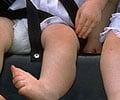Native American children who live in rural areas are at greater risk of clubfoot recurrence following treatment than other rural populations, and researchers are beginning to understand why.
Native American children who live in rural areas are at greater risk of clubfoot recurrence following treatment than other rural populations, and researchers are beginning to understand why. According to a study published in the March 2009 issue of The Journal of Bone and Joint Surgery (JBJS), cultural differences and communication barriers are factors that appear to contribute to this increased risk.
In the Ponseti technique, after repetitive casting, a brace is used to treat the affected foot. The success of the technique relies heavily on the participation of the caregiver to make sure the brace is used properly. When use of the brace is discontinued before treatment is completed, the condition is much more likely to recur. Caregivers are more likely to stop using the brace if they do not fully understand its importance."The challenge of the Ponseti treatment regimen lies not in the initial cast correction, but in the success of educating the parents and family regarding their role in the bracing process, and in the provision of a brace that is acceptable to the child and family alike," said Elizabeth Szalay, MD, pediatric orthopaedic surgeon and chief of the Division of Pediatric Orthopaedics at the University of New Mexico, Carrie Tingley Medical Center in Albuquerque. "When physicians are unable to effectively communicate the treatment program to the parents or other caregivers, the Ponseti method is not as successful."
Recurrence levels are generally higher in a rural population than in an urban setting, Szalay notes, and are highest in patients who:
- have a yearly income of less than $20,000
- have public or no insurance
- are unmarried
- have an educational level of high school or less
But the level of recurrence is significantly higher in the rural Native American group than in any other group studied. Dr. Szalay noted that this indicates a lack of effective communication between the parent and the physician.
"Basically, we are not communicating well with the rural Native American population. Our message is not geared to their specific and unique culture," said Dr. Szalay. "We are not communicating effectively because we do not have a complete understanding and awareness of the cultural differences that exist. As orthopaedic surgeons, we need to educate ourselves about the cultural biases existing in all our patient populations."
Advertisement
- speak their native language
- follow native traditions
- utilize native healers in addition to modern medicine
- employ an extended family structure as caregivers
Advertisement
"The physician's skill as an educator is pivotal to a positive outcome of the Ponseti technique, as it is in many other treatments," Dr. Szalay noted. "An ability to communicate across cultural divides is essential to providing the best health care possible. The challenge will be to design an educational program geared to these families so these children will experience the same excellent long-term results as other ethnic and cultural groups."
Source-Newswise
SRM








